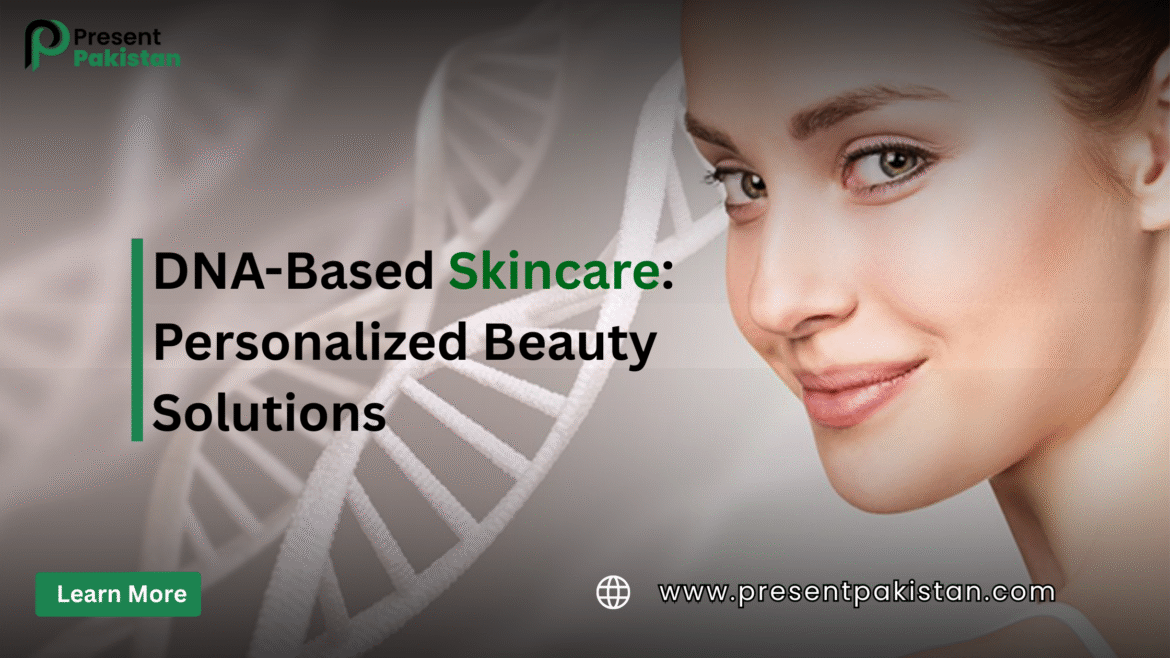The Future of Beauty
Traditionally, beauty has been mostly about either ingredients or a generic regime. But now, the emergence of DNA-based skincare (or cosmetogenomics) is reinventing the industry. Understanding your genetic profile allows for a personalized, exact, and ultimately effective skincare regime.
From UV damage to inflammation to pigmentation, everything can now be customized to your genetic traits, something generic creams could never achieve. It is not surprising that this is a trend rapidly entering the mainstream.
Sources: DesertBloom Skincare Future Market Insights Straits Research
Table of Contents
- DNA Skincare: Process
- The Scientific Basis: Genetics and Skin Behavior
- Market Trends & Future Growth
- Technological Advancements & Company Partnerships
- Product and Application Possibly
- Ethical & Practical Considerations
- How This Will Change Skincare Forever
DNA Skincare: Process
Process Flow
DNA Sample Collection: The process involves sending a simple cheek swab to the lab.
Lab analysis: The lab will analyze the key genes MMP1, SOD2, IL6, TYR and COL1A1 which pertain to wrinkles, oxidative stress, inflammation, pigmentation, and collagen.
Source: DesertBloom Skincare
Personalized report: Information on vitamin absorption, antioxidant defense, rigidity potential, and much more.
Bespoke routine: Prescribed products and active agents, at the right concentration for your very own DNA profile, retinoids, antioxidants, and protective actives are all specifically for you.
Sources: DesertBloom Skincare, xray.greyb.com
The Scientific Basis: Genetics and Skin Behavior
As we mentioned above, skin care now considers more than just melanin, collagen synthesis and skin barrier potential. Skin care can also evaluate over 20,000 genes.(xray.greyb.com)
In research studies, genetics can account for up to 60% of individual differences in skin aging. (PMC)
Recently, in March of 2025 L’Oréal and TruDiagnostic announced their partnership to study epigenomic markers and other indicators of longevity.This partnership will pave the way for the future of the personalization of beauty at a gene level.(Credence Research Inc.)
Market Trends & Future Growth
The global DNA-based skincare market increased from USD 6.64 billion (2022) to an estimated USD 11.32 billion (2031) for a CAGR of ~6.5%. (Source: Straits Research)
- Forecasts suggest about a 7% CAGR (2025-2032). (Source: LinkedIn)
- Regional outlook: North America leading, rapid adoption in Asia-Pacific framework, and EU & UK markets combine sustainability with regulatory frameworks.
- Leading companies: SkinDNA, Anake, EpigenCare, GeneU, & Caligenix.
Sources: Future Market Insights, Grand View Research, Credence Research Inc.
Technological Advancements & Company Partnerships
Omics Data Integration: The firm has developed an omic (genetic, epigenetic, and proteomic) approach to predicting product value. (xray.greyb.com)
AI & virtual platforms: Skin care in the future could involve DNA-based personalization, virtual try-ons, AI-powered advisors, and maybe nanobots to dispense the products. (Vogue Business)
Cross-Industry Synergy: Personalization is starting to cover all bases regarding fragrances, haircare and skincare that are consumer-specific, with the added value of epigenetics and AI. (Marie Claire UK)
Geographical Trends: South Korea is shaping up as a multi-modal and data-driven beauty paradigm. Exosome facials and regenerative treatments are common. (Vogue Business)
Product and Application Possibly
Know Beauty: co-founded by Vanessa Hudgens & Madison Beer: Genetic Testing 46 genetic markers (collagen quality; hyperpigmentation; sun sensitivity) to make recommendations on beauty products that are tailored to the individual. (Teen Vogue)
Recent Celebrity Trends: Salmon DNA facials, exosome microneedling, and PDRN treatments are the biggest beauty trends in Hollywood. (New York Post)
Virtual Beauty Technology: Companies like Revieve’s AI beauty coach use DNA data and lifestyle data using pattern identification and AI for recommendations. (Wikipedia, Marie Claire UK)
Ethical & Practical Considerations
- Cost & Access: This is a premium category. Kits and consultations are available from USD 59+. (Straits Research, Credence Research Inc.)
- Data Privacy: The abuse of genetic data is concerning and is demanding its management with strict regulatory frameworks (Future Market Insights, Credence Research Inc.)
- Efficacy vs. Hype: Genetics matter, but so does lifestyle, diet, and environmental exposure (PMC)
- R&D challenges: With traditional product cycles of 18–24 months, personalized genomics will require faster innovation cycles. (Vogue Business)
How This Will Change Skincare Forever
| Reason | Insight |
| Precision Outcomes | A customized routine based on your individual DNA. |
| Less Trial & Error | No more wasting money on products that don’t work for you. |
| Science-Based | Clear trust with genomic and AI-enabled personalization. |
| Market Demand | Consumers are looking for innovation, personalization, and clean data. |
| Global Innovation Hub | Prime movers in South Korea, North America, and EU are adopting. |
Conclusion
DNA-based skincare is not merely a fad; it is the future of personalized wellness. By accurately mapping your skin’s custom genetic blueprint, it allows for treatments that are so tailored, commoditized products could never match. The entire process can be so simple, from eliminating trial and error to approaching your effective regimen that has documented science to support you; it creates trust, efficiency and visible results for your skin journey.
The transition to personalized beauty, however, will face challenges as access to providers, costs, and personal data privacy are real considerations. Nonetheless, the swift uptake of genomic- and AI based solutions shows that the shift to personalized beauty is practically here. As more research develops and genomic solutions become less costly, DNA-based skincare will become mainstream, and we will transform our expectations for our routines.
Either way, your DNA is the ultimate beauty bible and the unexplored portal to a truly beautiful, glow-ready future.
Transform Your Skin Journey
Are you ready to inject the future into your beauty journey?
Are you prepared to find DNA based skincare solutions that are actually personalized to your skin? Guessworkdoes not apply, only beautiful outcomes.
Visit us at PresentPakistan.com now:
- Take the DNA Skin Quiz
- Explore Custom Beauty Plans
- Unlock Your Genomic Glow
Frequently Asked Questions (FAQ)
Q1: How much is a DNA-based skincare regimen?
DNA skincare kits generally start at around USD 59+ and vary due to brand and level of personalization to premium level.
Q2: What companies have DNA skincare?
The most prominent companies are SkinDNA, Anake, EpigenCare, GeneU, and Caligenix, along with celebrity brands such as Know Beauty.
Q3: Does my lifestyle still matter if I’m working with DNA skincare?
Yes, while DNA is a great starting place to begin to explore your skin health, it is very important to remember that lifestyle factors (diet, sleep, stress, and sun exposure) still play vital roles too.
Q4: What skin concerns is DNA-based skincare good for?
DNA-based skincare can help with wrinkles, pigmentation, collagen production, UV sensitivity, oxidative stress, and inflammation, and every individual varies depending on their genetic makeup.
Q5: Where is DNA-based skincare the most popular?
Right now, North America is leading the market, but Asia-Pacific is quickly catching up (most notably South Korea) and beginning to embrace DNA-based beauty treatment and regenerative beauty in vast numbers.
People Also Ask (PAA)
Q1. What is DNA-based skincare?
DNA-based skincare is a customized beauty experience that examines your genetic profile to discover which products and routines are best suited to your skin.
Q2. How does DNA skincare testing work?
DNA skincare testing involves getting a little DNA using a cheek swab, sequencing certain skin-related genes, and then providing a personalized skincare plan including a classy relationship to the right skincare products.
Q3. Is DNA skincare effective?
Yes! Numerous studies have shown genetics are important players in skin aging, collagen quality, pigmentation, and inflammation development. DNA-based routines avoid much trial-and-error, giving you precision skin care.
Q4. Is DNA skincare safe?
The skincare itself is completely safe; however, there are concerns about the data and privacy of genetic information. For this reason, it’s important for ethical regulations to be implemented.
Q5. Who should attempt DNA-based skincare?
Anyone that dislikes generic products, has sensitive skin, or is looking for personalized beauty solutions that are science-based.







